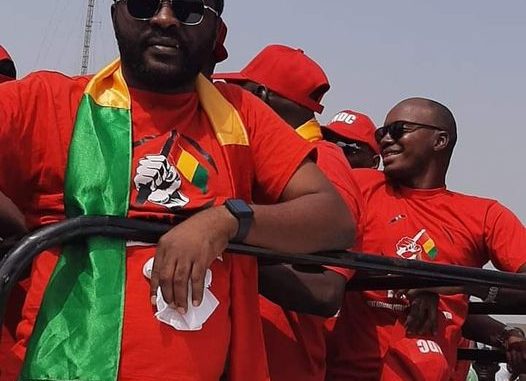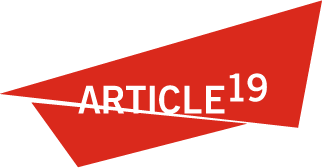
ARTICLE 19, Tournons la Page (TLP) – Guinée, and Organisation Guinéenne de défense des Droits de l’Homme et du Citoyen (OGDH), call on the Guinean authorities to work towards freedom of expression and assembly and to put an end to the arrest, detention and prosecution of individuals for expressing their opinions. The organisations take this opportunity to express their deep concern about the use of the judicial harassment to silence pro-democracy and human rights activists and journalists in Guinea.
On June 10, 2021, the activist Oumar Sylla, known as Foniké Menguè, Head of mobilization for the National Front for the Defence of the Constitution (FNDC) and Deputy Coordinator of the citizen movement TLP – Guinea, was sentenced to 3 years in prison for “communication and disclosure of false information, threats of violence or death”. His conviction followed a strange twist in events in which the authorities apparently combined two cases against him, one of which appeared to have previously been dropped.
The first case related to his arrest on 17 April, 2020, after he participated in the program “Les Grandes Gueules” on Radio Espace FM, where he denounced the arbitrary arrests and abuses that occurred in the city of N’Zérékoré on March 22, 2020 during the constitutional referendum and legislative elections. On 24 April 2021, he was charged with “disseminating false information” and held in pre-trial detention for 4 months. The charges against him were dropped by the court of first instance on 20 August. On the same day, the prosecutor appealed the decision to drop the charges and the authorities reportedly continued to arbitrarily detain him in prison until 27 August.
On 29 September 2020, Foniké was arrested without an arrest warrant, by men in civilian clothes in the streets of Matoto in Conakry, as he was about to participate in a demonstration organised by the FNDC to protest against the candidacy of President Alpha Condé for a third term. On 21 January 2021, Foniké was convicted and sentenced to 11 months in prison at the court of Mafanco for “participation in an assembly likely to disturb public order “. His lawyers appealed the decision. Both cases came before the Court of Appeal in May and the president of the court decided to join them in the same proceedings on 03 June 2021, with a single charge of communication and disclosure of false information. Despite reports that the prosecutor had requested two years in prison and the fine of 20.000.000 francs Guinean approximately (1.653 euros), the court sentenced him to three years.
On 19 May 2021, journalist Amadou Diouldé Diallo of Radio Télévision Guinéenne (RTG) was released after nearly three months in detention. He had been arrested on 27 February 2021 following his comments on the closure by Guinea of its land borders with neighbouring countries shortly before the controversial October 2020 election. The statements were reportedly made on a radio program called “oeil de lynx” on 21 January 2021. He was charged with “offending the head of state” on 1 March 2021, convicted and sentenced to pay a fine of 5 million Guinean francs (415 euros) by the court of first instance on 19 May.
On 2 June 2021, Alpha DialloJournalist-blogger, was arrested and detained at the police station in Sinfonia/Conakry after a road-check that went wrong while he was on duty returning from a field investigation. Although Alpha showed the proof that he was journalist and his mission order, he was beaten and assaulted during his arrest. Even if he was released after one day in custody, he was arraigned before a judge for contempt of state officer. On 15 June 2021, he was sentenced to a fine of 500,000 Guinean francs (41, 49 Euros). Alpha Diallo is a critical voice in Guinea and has repeatedly denounced internet shutdowns in country during elections and protests.
The decisions taken by court against activists and journalists appear to lack impartiality and are disproportionate. Under international human rights law, all legislation restricting the right to freedom of expression must meet the test of legality, necessity, and proportionality. This requires that the limitation must be: provided for by law, In pursuit of a legitimate aim, and be necessary in a democratic society. In addition, the Declaration of principles on Freedom of Expression and access to information in Africa 2019 states that public figures must tolerate a greater degree of criticism than ordinary citizens and sanctions should never be so severe as to interfere with the exercise of the right to freedom of expression. It further requires states to repeal laws that criminalise sedition, insult and the publication of false news.
Background
In October 2019, Guinea experienced high tensions since the announcement of the constitutional revision that gave the president of the Republic the power to run for a third term. Demonstrations organised to contest this decision were violently repressed, with several deaths and arrests of opponents and demonstrators recorded throughout the election period. Some activists, opponents were arrested without warrant on 6 march 2020 before the election and mid-December after the election. In addition, the authorities reportedly targeted those suspected of protesting and arbitrarily arrested and detained them for several weeks, often without a warrant, without charge and without access to their lawyers, or family. Many spent months without being brought before a judge. ARTICLE 19, Amnesty International and Some human rights organizations repeatedly denounced the attacks on freedom of expression, the harsh conditions of detention, which resulted in at least four deaths, including of three UFDG activists. This led the international community to urge the authorities to investigate the violence and bring the perpetrators to justice. In February 2021, the High Commissioner for Human Rights, Michelle Bachelet, stated, “The arrest and detention of opposition members and civil society activists on false charges of undermining the internal security of the State, in the context of last year’s presidential elections, seriously undermines the foundations of democratic governance,” and further urged the authorities to, ” release all those detained for exercising their rights to freedom of expression, peaceful assembly and participation, and to ensure fair trials for those accused of criminal offenses”.
The government finally responded by releasing, and taking some of them to court To date, it is difficult to obtain figures on the status of those arrested and released in connection with the presidential election. The authorities must urgently provide a full report and share the information with the national and international community. They must also ensure respect for human rights, cease all judicial harassment, threats, and intimidation against opponents and activists.
Civil society organisations call on the authorities to:
– Immediately and unconditionally release Oumar Sylla, arrested for exercising his right to freedom of expression
– Ensure that freedom of expression and demonstration is respected in accordance with regional and international standards
– Repeal all criminal sanctions which criminalises publication of false news insults and offending the head of state in accordance with international standards.
Stop the judicial harassments against journalists, human rights defenders, political dissidents and protesters,
Signed by:
Alfred Bulakali, Deputy Regional of ARTICLE 19 West Africa
Ibrahima Diallo, Coordinator of the citizen’s movement “Tournons la page” – Guinea
Souleymane Bah, President of the Guinean Organization for the Defense of Human and Citizen Rights
